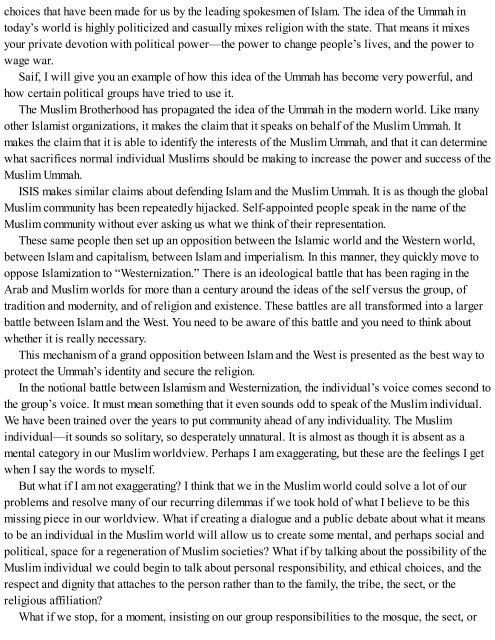1250119847
You also want an ePaper? Increase the reach of your titles
YUMPU automatically turns print PDFs into web optimized ePapers that Google loves.
choices that have been made for us by the leading spokesmen of Islam. The idea of the Ummah in<br />
today’s world is highly politicized and casually mixes religion with the state. That means it mixes<br />
your private devotion with political power—the power to change people’s lives, and the power to<br />
wage war.<br />
Saif, I will give you an example of how this idea of the Ummah has become very powerful, and<br />
how certain political groups have tried to use it.<br />
The Muslim Brotherhood has propagated the idea of the Ummah in the modern world. Like many<br />
other Islamist organizations, it makes the claim that it speaks on behalf of the Muslim Ummah. It<br />
makes the claim that it is able to identify the interests of the Muslim Ummah, and that it can determine<br />
what sacrifices normal individual Muslims should be making to increase the power and success of the<br />
Muslim Ummah.<br />
ISIS makes similar claims about defending Islam and the Muslim Ummah. It is as though the global<br />
Muslim community has been repeatedly hijacked. Self-appointed people speak in the name of the<br />
Muslim community without ever asking us what we think of their representation.<br />
These same people then set up an opposition between the Islamic world and the Western world,<br />
between Islam and capitalism, between Islam and imperialism. In this manner, they quickly move to<br />
oppose Islamization to “Westernization.” There is an ideological battle that has been raging in the<br />
Arab and Muslim worlds for more than a century around the ideas of the self versus the group, of<br />
tradition and modernity, and of religion and existence. These battles are all transformed into a larger<br />
battle between Islam and the West. You need to be aware of this battle and you need to think about<br />
whether it is really necessary.<br />
This mechanism of a grand opposition between Islam and the West is presented as the best way to<br />
protect the Ummah’s identity and secure the religion.<br />
In the notional battle between Islamism and Westernization, the individual’s voice comes second to<br />
the group’s voice. It must mean something that it even sounds odd to speak of the Muslim individual.<br />
We have been trained over the years to put community ahead of any individuality. The Muslim<br />
individual—it sounds so solitary, so desperately unnatural. It is almost as though it is absent as a<br />
mental category in our Muslim worldview. Perhaps I am exaggerating, but these are the feelings I get<br />
when I say the words to myself.<br />
But what if I am not exaggerating? I think that we in the Muslim world could solve a lot of our<br />
problems and resolve many of our recurring dilemmas if we took hold of what I believe to be this<br />
missing piece in our worldview. What if creating a dialogue and a public debate about what it means<br />
to be an individual in the Muslim world will allow us to create some mental, and perhaps social and<br />
political, space for a regeneration of Muslim societies? What if by talking about the possibility of the<br />
Muslim individual we could begin to talk about personal responsibility, and ethical choices, and the<br />
respect and dignity that attaches to the person rather than to the family, the tribe, the sect, or the<br />
religious affiliation?<br />
What if we stop, for a moment, insisting on our group responsibilities to the mosque, the sect, or
















